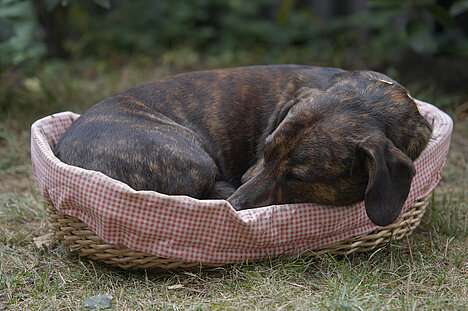Parvovirus

Parvovirus is a dangerous and contagious disease that mainly affects young dogs. In this article you will learn what parvovirus is, how to recognize and treat it, and how to protect your dog from it.
What is parvovirus?
Parvovirus is a virus that infects and destroys the intestinal cells of dogs. This results in severe diarrhea, vomiting, fever and loss of appetite. The loss of fluids and electrolytes can lead to dehydration, shock and death. Parvovirus is very resistant and can survive in the environment for a long time. It is transmitted through direct contact with infected dogs or their excrement.
How do I recognize parvovirus?
The first symptoms of parvovirus usually appear 3 to 10 days after infection. They are
- Bloody diarrhea with a foul odor
- vomiting
- fever
- weakness
- Loss of appetite
If you notice these signs in your dog, you should see a vet immediately. Early diagnosis and treatment are crucial for your dog's chances of survival.
How is parvovirus treated?
There is no specific treatment for parvovirus. Treatment is aimed at alleviating the symptoms and strengthening the dog's defenses. This includes
- Fluid and electrolyte replacement
- Antibiotics against bacterial infections
- painkillers
- Appetite stimulants
Most dogs need to be hospitalized in a veterinary clinic for several days, where they receive intensive care. Recovery depends on the dog's age, state of health and immune system. Unfortunately, around 10 to 20 percent of infected dogs die despite treatment.
How can I protect my dog from parvovirus?
The best prevention against parvovirus is vaccination. Vaccination should begin at 6 to 8 weeks of age and be repeated every 3 to 4 weeks until the dog is 16 weeks old. After that, an annual booster should be given. The vaccination not only protects your dog, but also other dogs in your environment.
In addition to the vaccination, you should take the following precautions:
- Avoid your dog coming into contact with sick or unvaccinated dogs
- Regularly clean and disinfect the objects and surfaces that your dog uses
- Wash your hands frequently, especially after handling other dogs
- Dispose of your dog's excrement properly
Parvovirus is a serious disease that can threaten your dog's life. But with the right prevention and treatment, you can keep your dog healthy and happy.
The authors assume that a veterinarian should be consulted if an animal is ill and that medication should only be taken after consultation with a doctor or pharmacist. Only an individual examination can lead to a diagnosis and treatment decision.
We help you find the nearest vet → This way